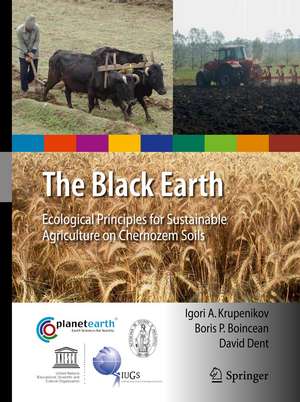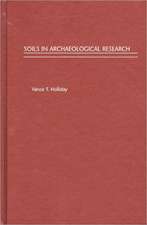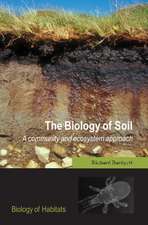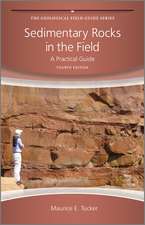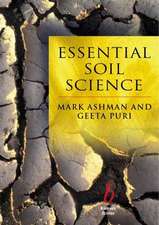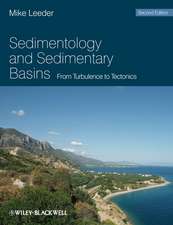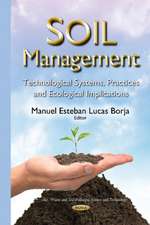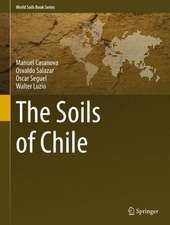The Black Earth: Ecological Principles for Sustainable Agriculture on Chernozem Soils: International Year of Planet Earth
Autor Igori Arcadie Krupenikov, Boris P. Boincean, David Denten Limba Engleză Paperback – 21 apr 2013
| Toate formatele și edițiile | Preț | Express |
|---|---|---|
| Paperback (1) | 557.20 lei 39-44 zile | |
| SPRINGER NETHERLANDS – 21 apr 2013 | 557.20 lei 39-44 zile | |
| Hardback (1) | 567.05 lei 39-44 zile | |
| SPRINGER NETHERLANDS – 16 mar 2011 | 567.05 lei 39-44 zile |
Preț: 557.20 lei
Preț vechi: 696.51 lei
-20% Nou
Puncte Express: 836
Preț estimativ în valută:
106.62€ • 111.91$ • 88.50£
106.62€ • 111.91$ • 88.50£
Carte tipărită la comandă
Livrare economică 07-12 aprilie
Preluare comenzi: 021 569.72.76
Specificații
ISBN-13: 9789400735552
ISBN-10: 9400735553
Pagini: 172
Ilustrații: XXVI, 146 p.
Dimensiuni: 193 x 260 x 9 mm
Greutate: 0.36 kg
Ediția:2011
Editura: SPRINGER NETHERLANDS
Colecția Springer
Seria International Year of Planet Earth
Locul publicării:Dordrecht, Netherlands
ISBN-10: 9400735553
Pagini: 172
Ilustrații: XXVI, 146 p.
Dimensiuni: 193 x 260 x 9 mm
Greutate: 0.36 kg
Ediția:2011
Editura: SPRINGER NETHERLANDS
Colecția Springer
Seria International Year of Planet Earth
Locul publicării:Dordrecht, Netherlands
Public țintă
ResearchCuprins
Preface.- 1. Introduction.- 2. The soil cover.- 3. Soil texture and structure.- 4. Soil mineralogy and elemental composition.- 5. Adsorption capacity and reaction.- 6. Soluble salts and soil solution.- 7. Humus - the guardian of soil fertility and global carbon sink.- 8. The nitrogen riddle.- 9. Phosphorus and sulphur budgets.- 10. Life in the soil.- 11. Soil structure, soil water and drought.- 12. The chernozem family.- 13. Accomodating soil diversity.- 14. Society's perspective.- 15. Biological cycles.- 16. Soil health and soil quality.- 17. Farming and soil health.- 18. Experimental confirmation of the efficiency of various farming systems.- 19. The past, present and future of the chernozem.
Notă biografică
Igori Krupenikov is soil scientist, Emeritus Professor, honoured member of the Moldovan Academy of Sciences and State Laureate, working at the Nicolai Dimo Institute of Soil Science and Agrochemistry in Chisinau. Boris Boincean is agronomist, long-time Director and continuing Head of the Department of Sustainable Farming Systems of the Selectia Research Institute for Field Crops and also Professor at the Aleco Russo State University at Balti, in Moldova. David Dent is former Director of ISRIC - World Soil Information in Wageningen, awarded the Australian Centenary Medallion for scientific leadership of the National Action Plan for Salinity and Water Quality, and long-time teacher and researcher at the School of Environmental Sciences, University of East Anglia.
Textul de pe ultima copertă
Soil is the Earth’s living skin. It provides anchorage for roots, holds water long enough for plants to make use of it and the nutrients that sustain life – otherwise the Earth would be as barren as Mars. It is home to myriad micro-organisms and armies of microscopic animals as well as the familiar earthworm that accomplish biochemical transformations from fixing atmospheric nitrogen to recycling wastes; it receives and process all fresh water, provides the foundations for our built environment; and comprises the biggest global carbon store that we know how to manage. This book is about the best soil in the world - the black earth or chernozem: how it is being degraded by farming and how it may be farmed sustainably. Industrialisation of farming has laid bare contradictions between the unforgiving laws of ecology and economics. Soil organic matter is the fuel that powers soil systems and the cement that holds the soil together – and in place – but agriculture is burning it up fasterthan it is being formed: even the chernozem cannot long survive this treatment. Here is the evidence for this trend and, based on long-term field experiments, ecological principles for sustainable agriculture that can reverse the trend and, at the same time, feed the world. Unlike other volumes in the series, this is not an edited collection of scientific papers. The authors have chosen the classical monograph to be near to the reader from beginning to end - to convey their anxiety about the state of the land and their optimism about the possibility of retrieving the situation by changing the social and political approach to the land so as to provide the necessary incentives for sustainable land use and management.
About the authors
Igori Krupenikov is soil scientist, Emeritus Professor, honoured member of the Moldovan Academy of Sciences and State Laureate, working at the Nicolai Dimo Institute of Soil Science and Agrochemistry in Chisinau. Boris Boincean is agronomist, long-time Director and continuing Head of the Department of Sustainable Farming Systems of the Selectia Research Institute for Field Crops and also Professor at the Aleco Russo State University at Balti, in Moldova. David Dent is former Director of ISRIC - World Soil Information in Wageningen, awarded the Australian Centenary Medallion for scientific leadership of the National Action Plan for Salinity and Water Quality, and long-time teacher and researcher at the School of Environmental Sciences, University of East Anglia.
About the authors
Igori Krupenikov is soil scientist, Emeritus Professor, honoured member of the Moldovan Academy of Sciences and State Laureate, working at the Nicolai Dimo Institute of Soil Science and Agrochemistry in Chisinau. Boris Boincean is agronomist, long-time Director and continuing Head of the Department of Sustainable Farming Systems of the Selectia Research Institute for Field Crops and also Professor at the Aleco Russo State University at Balti, in Moldova. David Dent is former Director of ISRIC - World Soil Information in Wageningen, awarded the Australian Centenary Medallion for scientific leadership of the National Action Plan for Salinity and Water Quality, and long-time teacher and researcher at the School of Environmental Sciences, University of East Anglia.
Caracteristici
State-of-the-art review of soil science and management Comprehensive analysis of current problems with soil Thorough discussion of projected problems in the near future Recommendations for achieving sustainability
